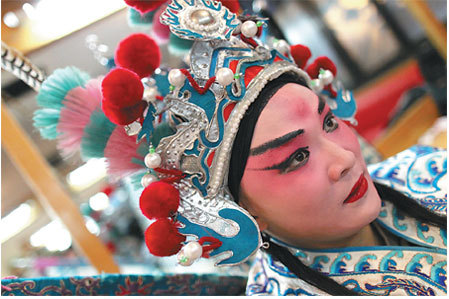 |
|
Sichuan Opera actor. Zhu Xingxin / China Daily
|
When wiped off with a rapid movement, the countenance of the face appears to change.
Blowing mask uses powder cosmetics in gold, silver and ink.
A tiny can with powders is placed on the floor of the stage. When actors need to change faces, they blow into the can to make the powder fly up and stick to their face.
Pulling mask is the most complex, requiring actors to draw different images on pieces of well-cut damask, link them with silk thread and paste them to their face one by one.
The silk thread is fastened in the belt or other inconspicuous part of the costume. Covered by dance movements, the actor quickly whisks away the masks one by one as the drama develops.
Performers can change some 10 masks in less than 20 seconds.
In addition to interesting culture, the capital of Sichuan province also has rich historical relics.
It is home to the remains of the Jinsha civilization that dates back more than 3,000 years.
Widely believed to have been the capital of the ancient Shu state, the site is hailed as one of the major archeological discoveries in China in the 21st century.
One of the Jinsha relics unearthed is a gold foil rendering of a divine solar bird. It is now used as the symbol of Chengdu and its local cultural heritage.
The city also has the Qingcheng Mountains and the Dujiangyan irrigation system.
Qingcheng has long been recognized as the birthplace of Taoism, China's ancient indigenous religion, while Dujiangyan is considered to be the oldest functioning water-control project in the world.
We Recommend:
